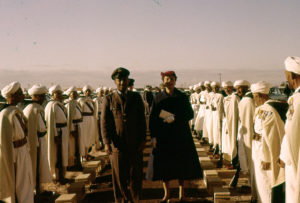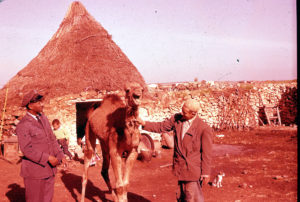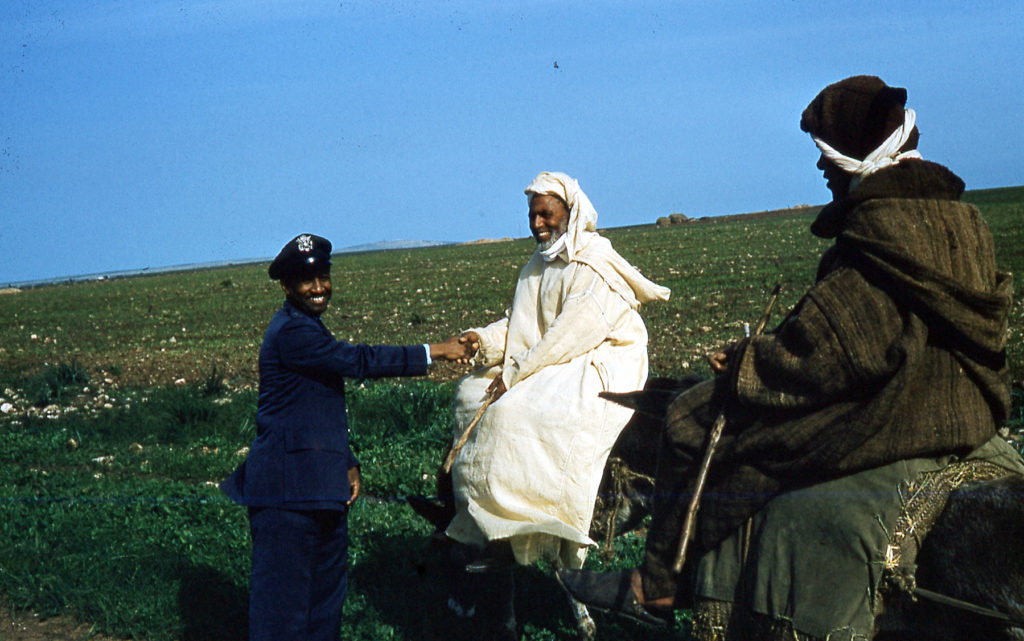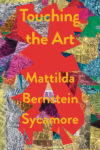From Murray Talks Music: Albert Murray on Jazz and Blues by Albert Murray, edited by Paul Devlin (University of Minnesota Press, 2016). Used by permission of the publisher. Copyright 2016 by the Regents of the University of Minnesota. All rights reserved.
From 1955 to 1958, Captain Murray was stationed at Nouasseur Air Base in Morocco by the U.S. Air Force. He was invited by the U.S. Information Service to give talks on jazz in 1956 and 1958, with the goal of improving relations between the U.S. military and local intellectuals. Murray gave several presentations, in French, at the U.S. embassy in Rabat, the Maison d’Amérique in Casablanca, and elsewhere. Notices for these talks were printed in French and Arabic.

Captain Murray and Mrs. Murray in Morocco (late 1950s). © Estate of Albert Murray.
One of his presentations attracted more than one hundred people. There was more to these talks than what survives here, such as his commentary on various records after he played them. These talks were his first extended public statements on jazz and were met with critical enthusiasm. He received several good reviews in the local French- language press. He received glowing letters of commendation from U.S. diplomats and high-ranking military officers who believed the talks achieved their objective. This piece, all that survives of the talks, reflects the clarity and consistency also revealed in his letters to Ralph Ellison from these years, published in Trading Twelves: The Selected Letters of Ralph Ellison and Albert Murray (2000). At the end of the preceding interview, Murray discusses his time in Morocco and his relationship with its community of jazz listeners.
Translated from the French by Lauren Walsh
During our previous meeting, I spoke of some features of the form of expression of black Americans, of their sermons, prayers, spirituals, and gospel and blues songs. These are the fundamental elements of music that interest us.
Jazz is the ancestral form of expression of the black American. It is intimately linked to his religious sentiments and includes his folkloric expression as well as his modern development. In point of fact, jazz is, without doubt, the richest and most significant form of artistic expression of the black American sensibility that we have in the United States.
Much has been written on African antecedents of jazz, a most in- teresting question, but it is important to note that jazz is the creation of the black American only, that is to say, l’Américain d’Afrique (1). Africans in Europe do not play jazz, nor do Africans in Latin America; and jazz in Africa does not exist, with the exception of Lionel or Armstrong, when they come to Tangier, Casablanca, or Marrakesh.

Captain Murray in Morocco (late 1950s). © Estate of Albert Murray.
Tonight I am going to play records that represent, in my opinion, the most eminent and remarkable accomplishments that jazz music has ever achieved.
After hearing each disc, I’d like your respective opinions on what you just heard. All questions or discussions will be welcome and could only be beneficial.
In particular, there are three aspects of this music that I would like to stress:
1. It represents the principal form of artistic expression of the black American. As such, it personifies almost all aspects of black life in the United States. (At the same time, we must add that this music exists not only as the intimate and personal expression of black life, but that it is meaningful and accessible to any individual in the world.) It is, moreover, the distinctive feature of all art to be meaningful at any time and any place.
2. In addition, this music represents life in the United States in our time. It is also a product of American society. It provides us a picture of the fundamental conditions of life in America. In this music, you will not find the “happy endings” of Hollywood films or the artificial sentiments displayed in best-selling novels. You will only find simple feelings, deeply real, such as: sadness, melancholy (the blues), despair, or exuberant happiness, which is nothing more than a reaction against this despair. In a word, you have the portrait of the standard life of the average American.
3. The freedom of expression of black musicians and their improvisations are a lesson they offer to human beings, in order to help them adapt to the exigencies of modern life.
The principles of morality that can be drawn from this music are, in short: flexibility, the art of adapting, and the necessity of continuous creation in a perpetually oppressive and unstable world.
That is why this music helps us to free ourselves from conformity, which is just a form of stagnation and snobbery, thus always guiding us toward the future.
Albert Murray (1916-2013), a novelist, essayist, and poet, was the author of twelve books, published from 1970-2005. He was raised on the outskirts of Mobile, Alabama, and after a career in the Air Force, lived in Harlem from 1962 on.
A Note on This Translation
I endeavored to produce a closely literal translation from the French but also to render this talk in graceful, contemporary English. Murray seemed comfortable writing in French, and even editing his own writing. In fact, the document from which this translation was performed contains Murray’s handwritten changes, neatly inserted alongside the typed text of this talk. Each of those changes is reflected in this translation. Likewise, the phrase underlined here (black American) is also underlined in the original French.
—Lauren Walsh, New York University
Note
1. In keeping with the rest of Murray’s oeuvre, this term appears in the French in order to obviate any association with the English-language term “African American,” not current in the 1950s and, later, an expression that Murray often criticized (for instance, in this book, see pp. 136, 171).—Ed.
This post may contain affiliate links.








